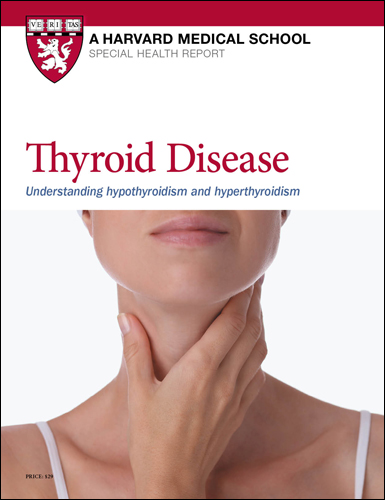Harvard Health Blog
Is my thyroid making enough hormone?

Feeling tired, sluggish and not quite yourself? These symptoms could indicate an underactive thyroid gland (hypothyroidism), but they are just as likely to be related to something else, such as not getting enough sleep, stress or depression.
What is hypothyroidism?
At the front of your neck lies the thyroid, a butterfly-shaped gland that makes the hormone T4. When released into the bloodstream, T4 converts to T3, the most active form of thyroid hormone. Having sufficient levels of these hormones is important because the thyroid helps regulate body temperature, metabolism, blood pressure, and heart rate.
Hypothyroidism occurs when the thyroid is underactive (not working optimally). It affects as many as five in 100 people. Symptoms of hypothyroidism include fatigue, cold intolerance, constipation, dry skin, hair loss, muscle weakness, and weight gain.
How is hypothyroidism diagnosed?
Most major medical associations recommended diagnosing hypothyroidism through a blood test using a simple two-step approach.
- First, doctors order a blood test to check the level of thyroid stimulating hormone (TSH), which the pituitary gland in the brain releases to stimulate thyroid hormone production.
- If TSH is high, then the same blood sample can be used to measure the free T4.
It may help to think of the pituitary gland as a thermostat and the thyroid gland as a heater. The thermostat senses low temperatures outside of the body and turns on the internal heater. When the room temperature reaches a set threshold, the thermostat signals the heater to stop working. In the body, it is the TSH produced by the pituitary gland that signals the thyroid to make more T4. When there is less free T4 in the blood, the pituitary senses the low levels and starts making more TSH.
TSH is standard initial screening test for hypothyroidism because the TSH level rises even before the T4 level falls below normal. So, in our analogy, the body's thermostat is very sensitive to small variations in temperature.
That's why a normal TSH almost always means the thyroid gland is healthy and producing enough thyroid hormones. While a simple TSH blood test is a very accurate way to screen for hypothyroidism, an elevated TSH alone may not be enough to confirm the diagnosis.
When TSH doesn't tell the whole story
A normal TSH level falls between 0.4 and 5.0 milliunits per liter (mU/L). Except for rare circumstances, a TSH of 10 mU/L or higher means the person is hypothyroid. If the TSH is between 5 and 10 mU/L and the T4 level is definitely low, that is also consistent with hypothyroidism and should be treated with thyroid medication.
However, many people (including those with and without symptoms) have TSH values between 5.0 and 10 but normal levels of T4. It's called mild or subclinical hypothyroidism.
While most studies suggest that treatment with thyroid pills is not needed for subclinical hypothyroidism, it's important to note that some people do feel better once treatment starts.
A personalized approach
As you and your doctor weigh the pros and cons of starting a low dose of levo-thyroxine for subclinical hypothyroidism, consider the following:
- If your T4 is in the middle of the normal range or higher, you probably won't benefit from starting drug therapy.
- Younger women looking to become pregnant usually start thyroid drug therapy, as it may improve fertility.
- If your T4 is normal, but at the lower end of normal, a trial of low dose therapy for 6 to 8 weeks is reasonable.
- Whether you opt to wait or start thyroid medication, get a recheck of your TSH. Depending on your personal situation, that might be as soon as 6 weeks or in 6 months.
Adapted from a Harvard Health Blog post by Marcelo Campos, MD
Image: magicmine/Getty Images
About the Author

Harvard Health Publishing Staff
Disclaimer:
As a service to our readers, Harvard Health Publishing provides access to our library of archived content. Please note the date of last review or update on all articles.
No content on this site, regardless of date, should ever be used as a substitute for direct medical advice from your doctor or other qualified clinician.













